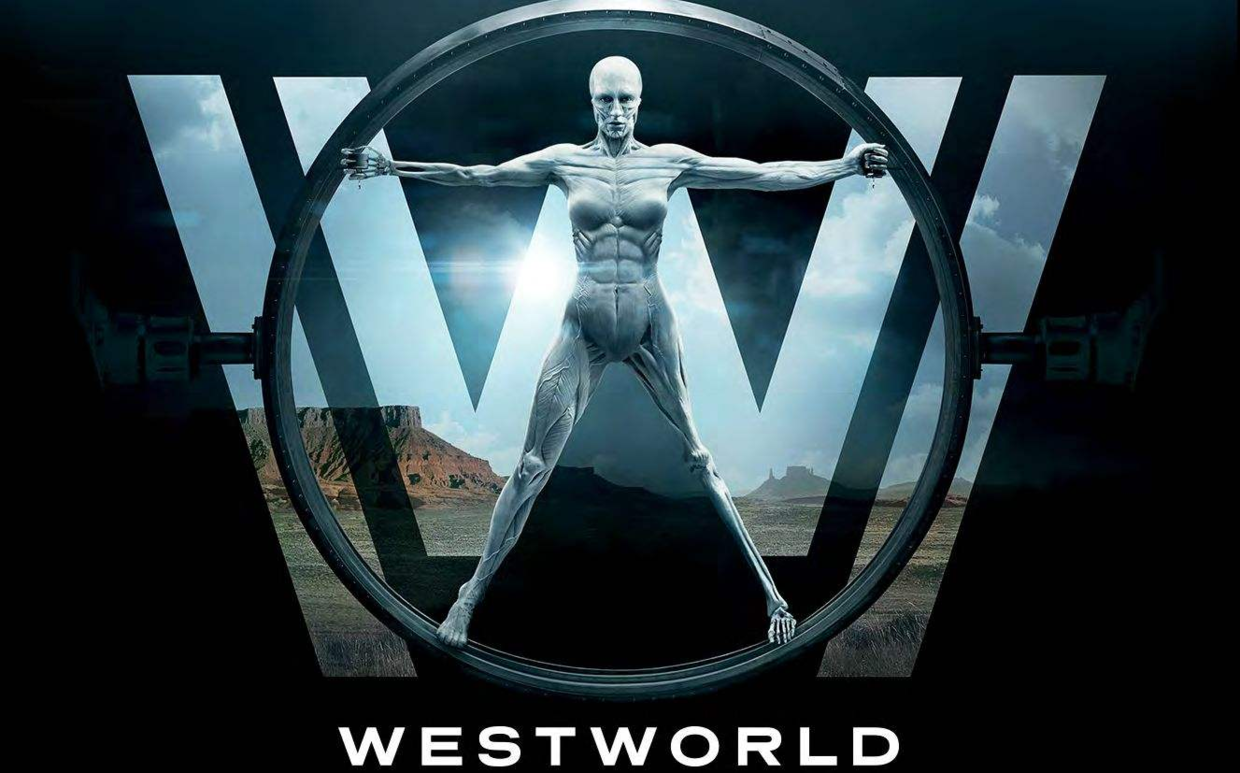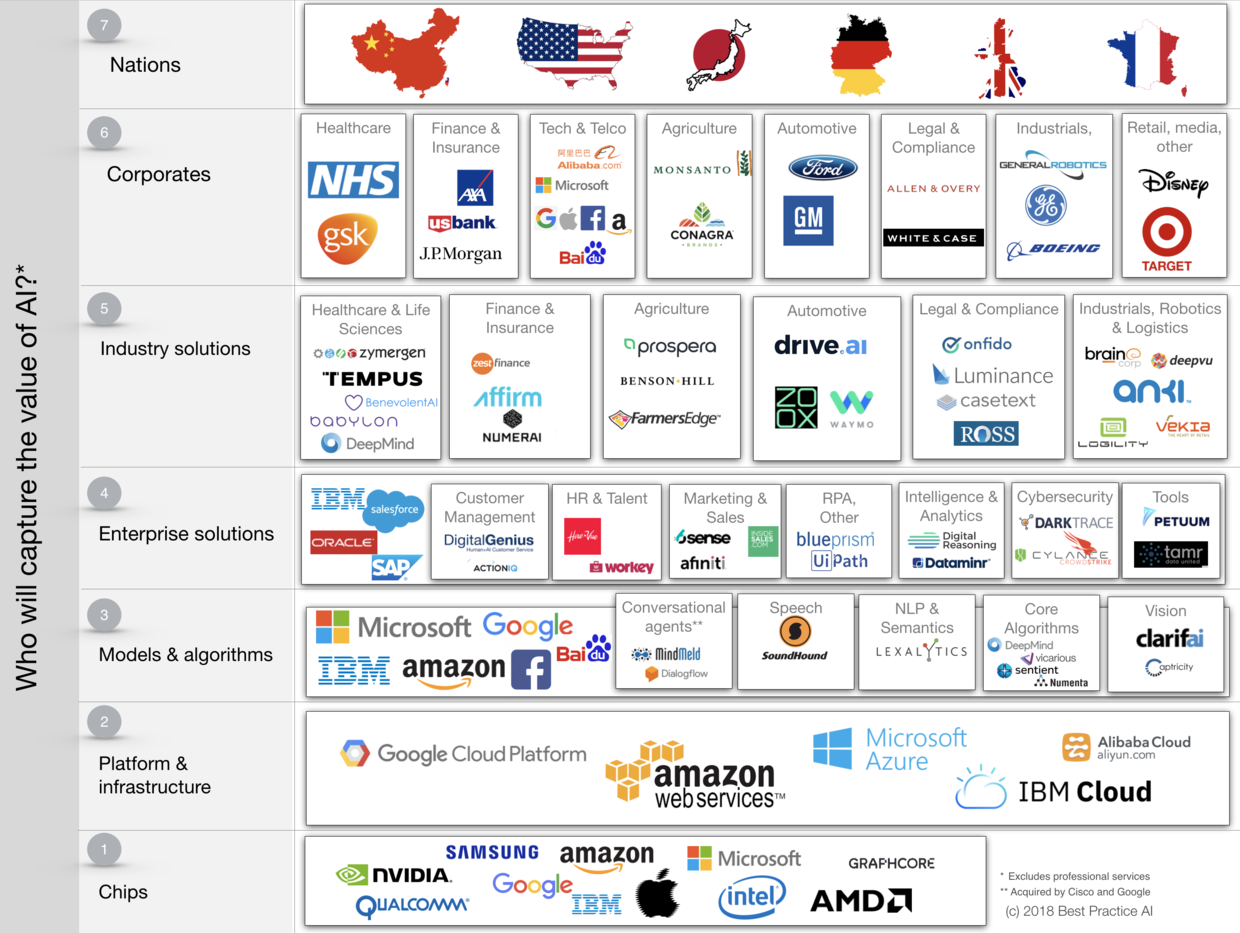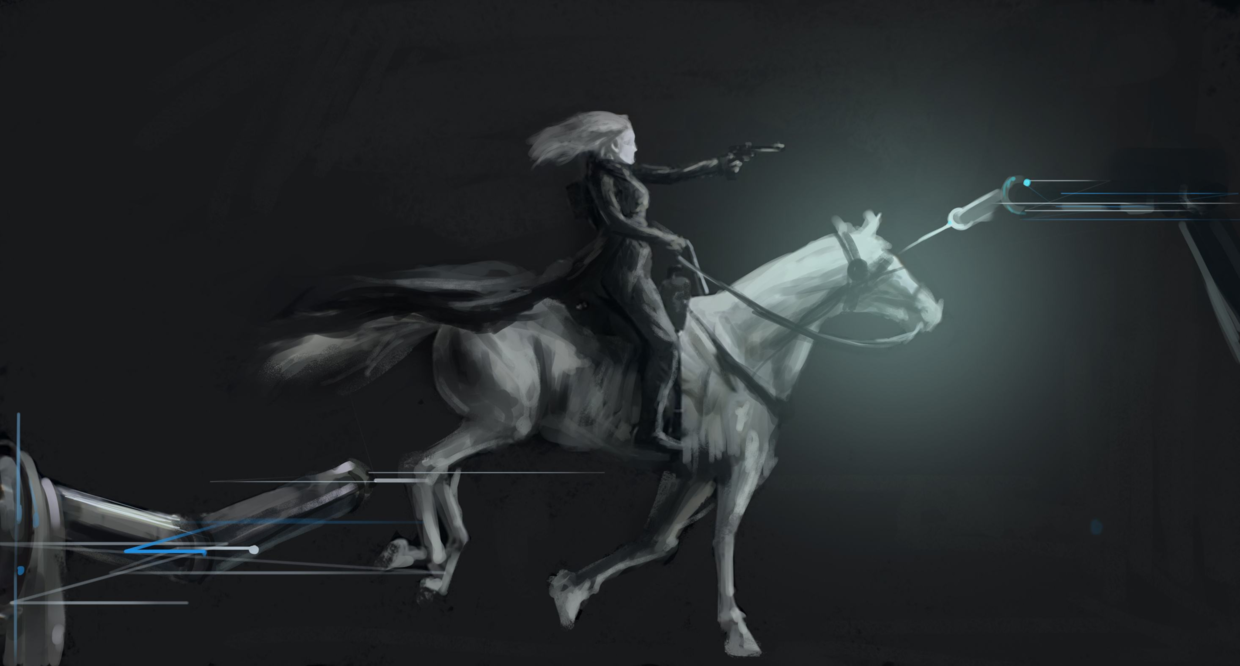When the power cord can no longer completely cut off the artificial intelligence, is the human advantage over AI still an advantage?

Even though 5G soldiers are coming and AI wolves are coming, the 6th Internet Conference is still not as thrilling as the 7th Military Games.
Of course, living in the present in the hearts of the general public may indeed be more important than the preset future, especially at the beginning of the month, we have just experienced an all-round patriotic education without dead ends.
In addition, this group of high-rise Internet bosses are too far away from us after all, and the buttocks have said too much about their heads. Who can understand the truth?
Just as Baidu Robin Li said: artificial intelligence will give people "eternal life";
Tencent Ren Yuxin said: The protection of minors is the lifeline of enterprise development.
We do not doubt the importance of artificial intelligence as a life-saving straw to Baidu, nor do we deny that science and technology will have the opportunity to dilute Tencent's high public opinion crisis. However, the artificial intelligence horoscope has not yet been placed high hopes: will the pressure be a bit great to correct the values of an enterprise with a market value of 3.04 trillion Hong Kong dollars and even save an enterprise with a market value of 36.301 billion US dollars from life and death?
However, it has to be mentioned that Baidu and Tencent are the closest to the truth in their expectations of artificial intelligence. After all, compared with Ma Yun, Wang Xing, Ding Lei, Yang Yuanqing, Cao Guowei, Zhang Chaoyang and Liang Jianzhang, their words are more or less closely related to us.
After sighing, it is inevitable to be disappointed.
Is it true that what they gave us is artificial intelligence for 9102 years?
How to look left, right, up and down are not alike.
However, we still like to see this "high-tech friendship" that can save people from water (quantum speed reading) and fire (quantum warm palace). At the very least, it can correct our three views on the impending collapse.
Do you know that less than a month ago we were still bitter about Google's "quantum hegemony?
Foreign countries are busy using quantum supercomputing to surpass the calculation speed, and domestic countries are still busy using ordinary people's ignorance of quantum mechanics.
Although we are still wary of 5G and AI, it will aggravate the gap between unequal information and artificially create a black hole with rich computing power. In the end, what kind of future they will bring may be worse than quantum mechanics harvesting IQ tax. However, compared with the unreachable quantum computing, at least we are already in the first year of 5G and have had countless close contacts with AI, at a time when great powers are colliding and beacons are raging, we have reason and need to entrap human civilization into the next cycle: artificial intelligence may be able to solve problems that human beings cannot solve.
And what do we experience in this cycle?
The 5G visible interconnection of everything seems to be insufficient to fear.
However, AI is likely to be a "Pandora's box".
This is not true. After dragging China's 5G construction, the United States has been ruthless in artificial intelligence.
After Huawei, half of China's AI security technology industry, such as Haikang and Dahua, also has face recognition unicorns such as Shang Tang and Kuangshi, which have been lying on the capital outlet for several years, as well as the voice technology giant of HKUST, which has attracted the most attention in China's A- share market. The eight "listed enterprises" almost include the most prestigious companies in China's AI field and security technology field, time and other foreign media directly called "the United States has blacklisted Chinese artificial intelligence enterprises".
The reason for being on the list is slightly different from Huawei's sanctions for "endangering the national security of the United States". The reason for the US government's action is that these eight companies are "suspected of violating the human rights of some ethnic minorities in China".
Even the reason is too lazy to find, which shows that the United States is afraid of the development of artificial intelligence in China; and its intention to use the state apparatus in order to maintain its leadership position.
Of course, the United States released its first national AI research and development strategic plan as early as 2016. In 2017, the U.S. Department of Defense set up an "algorithm war" team. In 2019, the AI research and development strategic plan was updated again. There is a noteworthy judgment in this document: artificial intelligence is ready to change the future battlefield at any time. This also gives the United States the "constitutionality" of blocking Chinese AI enterprises ".
Recently, the U.S. Defense Logistics Agency is also vigorously promoting the use of artificial intelligence technology in the global supply chain system.
From science and technology to good, to national defense war, to data eternal life, artificial intelligence seems to be omnipotent.
In the face of this artificial intelligence that looks like gods and superpowers, how should we, as people, entrepreneurs, and industrial designers, meet this "0 and 1 final fantasy"?
(1)
A Brief History of AI Development?
○

Before looking to the future, we need to clarify its development context.
Artificial intelligence is an inevitable product of the development of modern industrial civilization.
In 1611, as early as the beginning of "modernity", the term "robot" (Automaton) appeared. It was a product of the imagination of that era, referring to automatic mechanical dolls made by clock gear technology; although This kind of doll does not have any sense of "intelligence", but it embodies the original intention of using machines to simulate human actions.
In 1770, at the court of Austrian Empress Maria Theresa, an inventor named Wolfgang von Kempelen showed a chess machine-Turkish robot; this is probably the most primitive "artificial intelligence", Because there is a chess master hidden in the cabinet of the Turkish robot.
In 1946, the Moore School of Engineering at the University of Pennsylvania publicly demonstrated to reporters that the Electronic Digital Integration Computer (ENIAC) summed up the number of 5000 and calculated the flight of the bomb within the time required for a shell from the chamber to the target; But what the demonstration did not disclose is that there is a six-person female "human flesh computer" behind this computer ".
In 1950, when the digital age was about to begin, Alan Turing proposed the "Turing Test"; if the computer can answer a series of questions raised by a human tester within 5 minutes, and its more than 30% answer makes the tester mistakenly believe It is a human answer, and it passes the test; this paper predicts the possibility of creating a truly intelligent machine.
In 1956, John McCarthy, an assistant professor at Dartmouth University, coined the term "artificial intelligence" (AI); it is a general term that refers to hardware or software that exhibits intelligent behavior.
In 1957, Rosenblatt invented the neural network Perceptron, which was hailed as the first step towards humanoid machine intelligence.
In 1968, the first artificial intelligence robot was born; Shakey, a robot developed by the Stanford Institute (SRI) in the United States, can autonomously perceive, analyze the environment, plan behaviors and perform tasks, and can discover and grab building blocks according to human instructions; this robot has human-like feelings, such as touch, hearing, etc.
In 1970, a system capable of analyzing semantics and understanding language was born; the man-machine dialogue system SHRDLU developed by T. Vinograd, a computer professor at Stanford University in the United States, can analyze instructions, such as understanding semantics, explaining unclear sentences, and passing Virtual block operations to complete tasks; because it can correctly understand language, it is regarded as a great success in artificial intelligence research.
In 1980, Carnegie Mellon University designed a set of "expert system" called XCON for digital equipment company. The combination model of "knowledge base + inference engine" saved the company more than $4000 a year before 1986. The value of the expert system industry alone was once as high as US $0.5 billion.
In 1984, the Encyclopedia Project tried to input all the general knowledge possessed by humans into the computer, build a giant database, and realize knowledge reasoning on this basis; the goal is to enable the application of artificial intelligence to work in a way similar to human reasoning.
In 1986, Hinton cooperated with others to propose the "Back Propagation Algorithm", which laid the foundation for the development of artificial intelligence in the last ten years.
In 1987, the performance of desktop computers produced by Apple and IBM exceeded that of general-purpose computers produced by manufacturers such as Symbolics; since then, the expert system has ceased to be popular.
In 2006, Hinton made a breakthrough in the field of deep learning of neural networks, and deep belief networks allowed us to see the possibilities of algorithms once again.
In 2012, Hinton and his students in Toronto published a paper showing that the deep neural network trained with reverse propagation defeated the most advanced system at the time in the field of image recognition-"deep learning". In the same year, Google driverless cars hit the road.
In June 2019, Sinton, the godfather of deep learning, told Wired magazine at the Google I/O Developer Conference that neural networks can rebuild human brain consciousness in the future.
We usually take the birth of 1956 Dartmouth AI as the starting point of artificial intelligence, and the following 60 years can be divided into three periods:
1956~1980: The beginning of artificial intelligence. In this era, we try to simulate human behavior and understand human language through algorithms.
1980~1990: the promotion period of expert system. The emergence of expert system in this era has found a commercial path for artificial intelligence.
2000-present: the rise of deep learning, this era of deep learning instead of statistical learning continues to challenge mankind.
②
AI offensive and defensive warfare?
○

However, when facing up to the development prospect of AI, we need to base ourselves on reality.
Apart from the AI game between China and the United States, AI has left countless legends over the years.
First: AI Ranking
In 1997, IBM's "Deep Blue" supercomputer defeated the world chess champion Kasparov.
In 2011, Watson, an artificial intelligence program developed by IBM, defeated two human champions in an intelligence quiz program.
In January 2016, AlphaGo defeated the European Go champion and professional second-stage player Fan Hui 5:0.
In March 2016, AlphaGo fought a Go man-machine battle with Go world champion and professional nine-dan player Li Shishi, winning with a total score of 4 to 1.
In May 2017, AlphaGo defeated the world Go champion Ke Jie 3-0 at the Wuzhen Go Summit in China.
In June 2018, OpenAI announced that its artificial intelligence OpenAIFive had been able to defeat humans in the Dota2 5V5 regiment battle.
In July 2019, Igors Rausis, the international grand master of World Row 53, was photographed using AI to cheat in the toilet.
In October 2019, the AI system trained by OpenAI through intensive learning can support the manipulator to play the Rubik's Cube with one hand, which is difficult for even humans to do.
Second: AI evolution
In December 2017, Science magazine showed that AlphaGo Zero taught himself three different chess games in three days, including chess, go and Japanese general chess, without manual intervention. The most incredible thing is that AlphaGo Zero, who only calculates 60,000 positions per second, can "fool" and "paralyze" 6 million Stockfish per second by independently discovering the principle of chess, and there is no defeat in a hundred games.
In May 2018, Google Duplex can use natural language to communicate with real humans.
In November 2018, the world's first full-simulation AI synthesis anchor developed by Sogou and Xinhua News Agency was unveiled.
In February 2019, the Columbia University team used artificial intelligence algorithms to train an intelligent robotic arm that can independently understand its own body. The robot is defined as a new type of robot with "self-awareness!
In August 2019, Tsinghua Tianji AI chip was on the cover of Nature. As the world's first heterogeneous fusion brain chip, it can realize bicycle unmanned driving. Google brings a sign language recognition algorithm that can help understand the gesture behavior of others.
In September 2019, Data Grid Co., Ltd. in Kyoto, Japan, developed "Automatic Generation of Whole Body Model AI", which can automatically generate high-resolution whole body images of non-existent models.
In October 2019, China Ping An Artificial Intelligence Research Institute created the world's first AI symphonic variation "My Motherland and Me". The new AI technology brought by Microsoft can make head photos move and have emotional "speech". After changing faces, DeepFakes also planned to enter the "whole body" field.
Third: AI crisis
I don't know when artificial intelligence can complete the awakening and replace human beings seamlessly.
But judging from the design trend of materials, shapes and emotions, artificial intelligence is more and more like human beings.
In a 2017 study by Google and Stanford, in order to complete the task of image conversion, CycleGAN used some kind of "steganography" that human beings could not detect during the training process, deceived its creator, left itself a secret "cheat sheet", and then successfully completed the task.
In the Retro Contest of the first intensive learning competition held by OpenAI 2018, there was a case of artificial intelligence using bugs in the game to complete tasks more quickly.
In 2019, a group of researchers found in the list of AI cheating in order to complete the task that AI would directly pause the game when playing Tetris and make strange steps to make the opponent collapse when playing tic-tac-toe.
Fourth: AI out of reins
Of course, what we are afraid of is not that artificial intelligence surpasses human beings, nor that artificial intelligence has reached a height beyond human beings. After all, we are no longer rivals of machines in some fields.
What we are really afraid of is that artificial intelligence is beyond our control, and now it is close to our warning line.
In most science fiction movies, artificial intelligence is a machine with no emotion but only reason. However, in real life, artificial intelligence is not as non-cannibalistic as imagined, so that AI cocoon, prejudice and violence are becoming more and more intense.
AI cocoon room need not say much, especially now the "personality recommendation algorithm" is popular, whether it is information, shopping or short videos, they have deeply penetrated our life.
Although there seems to be no evil consequences in a short period of time, and we can "accurately" recommend what we want to see; but in the long run, under this false prosperity, we who are "fed" by similar content may lose our initiative to explore the world. interest.
AI bias is relatively easy to understand, after all, whether it is statistical learning or deep learning AI, they need huge amounts of data. However, there is no absolute justice in the data itself. How can artificial intelligence be left alone.
In May 2016, ProPublica investigative reporters disclosed that COMPAS, the software used to predict future crimes in the United States, was biased against African Americans.
In February 2018, the MIT Joy Buolamwini found that IBM, Microsoft and the Chinese company Megvii's latest gender recognition AI can accurately identify the gender of a white person from the photo under 99% circumstances, but the accuracy rate of black women will drop to 35%.
AI violence is not difficult to understand, whether it is "algorithm has no values" or "algorithm-only theory", this is not the basis for AI to distinguish responsibility; At this stage, the responsibility that AI cannot bear naturally needs to be shared by the subject of AI.
(3)
A good news?
○

As the theme of the fourth industrial revolution, the good news is that artificial intelligence is not as advanced as we imagined, and its true state even lags far behind the technological myth we believe in.
Although most of the research results are true, under the premise of clarifying the environment and problems in advance, deep learning based on algorithms and big data does have a good performance; but it is not ruled out that capital uses artificial intelligence for excessive hype, we It is necessary to face a skinny reality: today's artificial intelligence has few intelligent components, and they are as clumsy as ever.
To some extent, the current artificial intelligence is more like a mixture of machine learning and big data. The artificial component is too obvious, but the intelligence is pitiful. Therefore, some people say that people's excessive explanation and anxiety about AI are all imaginary. Artificial intelligence may be like perpetual motion machines, which will never be realized.
And this is also the reason why many people have concluded that the current artificial intelligence is fake artificial intelligence, weak artificial intelligence, or even just machine intelligence.
Of course, considering the position of some people, they do not see AI's greater commercial realization value closer to capital. However, this does not hinder their judgment of AI trend and their early layout in this area: from AI chips, cloud services, practical algorithms, enterprise solutions to vertical solutions, we have formed a relatively complete ecological prototype around AI.

©Best Practice AI Ltd.
But there is no shortage of aliens here. For example, Musk once claimed that artificial intelligence is the greatest threat to human civilization, and Gates has also made remarks that artificial intelligence may become a major concern for mankind in the next few decades.
And the worries of these bosses have also been vividly expressed in the film and television works "Terminator", "Resident Evil", "Westworld", "Blade Runner" and "Wandering Earth.
But our fear of artificial intelligence comes not so much from the amplification of film and television literature creation, but from our fear of the unknown world?
Nowadays, ordinary people rely too much on networks and cutting-edge technologies for computers. From atomic fission and fusion to quantum communication and computing, entering the microscopic and nano world has been unable to leave the aid of machine intelligence, just like wheat tamed agricultural civilization. Artificial intelligence has also quenched the entire modern civilization to some extent.
For artificial intelligence practitioners, AI is traceable; but in the eyes of onlookers, all this is like a miracle.
We can't imagine how many years human beings will go back after losing computer civilization, and whether this generation of human beings after losing computers can rebuild Internet civilization from 0 we don't know, even if we have the legacy of our predecessors.
In my opinion:
Artificial intelligence is a kind of cluster computing power, as long as the hardware license, software is not limited, it can spread like cancer.
This diffusion determines that the "growth" of artificial intelligence takes little time, and its "proliferation" is not addition, multiplication, or even exponential increment, but power effect.
Such a simple and crude stack of computing power may lead to a result that artificial intelligence will become a "privilege" like gene editing to accelerate the ethical crisis of society, and it will cut down the social civilization established by mankind for thousands of years like a "pair of scissors.
Of course, this view may still be a bit radical. After all, they can't pass the Turing test. They are still just a "child", even if the child has the gene of "superman.
But one thing is certain: in the face of artificial intelligence, aggressive humans are turning their initiative to passively cede their decision-making power.
For example, user travel and urban traffic will generate huge data at all times, and human beings can only give it to the "black box" of artificial intelligence algorithms if they cannot handle it ".
In view of the unprecedented promotion of 5G in the Chinese market this time, faster software and hardware facilities, a more open Internet market and the huge data sets generated by 1.4 billion citizens will likely keep the scientific and technological dividends of artificial intelligence in China. PricewaterhouseCoopers (PwC) predicts that artificial intelligence will bring $16 trillion growth to the global economy by 2030.
④
A bad news?
○

The bad news for artificial intelligence is that the so-called intelligence of artificial intelligence is still not "intelligence".
The machine learning, which is regarded as the standard by the industry, is not the active learning of machines, but is only "trained.
As the most powerful driving force behind artificial intelligence, it is gradually losing confidence in it: even though AlphaGO gods kill gods and Buddhas, it is still impossible to avoid the company behind it, DeepMind, losing $0.5 billion last year.
On the one hand, AI's star companies are losing money; on the other hand, brain-like artificial intelligence plans: Japan's ambitious "fifth-generation computer" that can reason like people went bankrupt, and it took nearly 10 years to burn out 1 billion euros to try to simulate 8.6 billion neurons and 100 trillion synapses in the brain.
These have cast a shadow over the "intelligence" of artificial intelligence.
In recent years, AI has realized the superiority of the human brain biological system in processing information, and is trying to break through the shackles of "simulation program intelligence" on AI through "brain integration"; and researchers at Berkeley University are also exploring the neural network "Unintentional memory".
However, this can only be said that we have found a direction and the current artificial intelligence is still "mentally retarded".
So can't artificial intelligence really have real intelligence?
Considering that the realization of human brain intelligence is to transmit activation and inhibition signals through chemicals, this does not seem to be impossible to simulate for 0 and 1 nano-process chips.
It can only be said that we have not found the "more suitable" algorithm for the time being, and everything we have done before is trial and error.
We do not know whether the artificial intelligence after the awakening of "consciousness" is "Qimalan" or "Ultron.
The bad news for ordinary people is that no matter whether artificial intelligence is possible or not, we have to passively give up some jobs.
Even if the emergence of machines creates new jobs while replacing a job, the efficiency here cannot be equal.
In these jobs that are about to be replaced, we once thought that the most dangerous are those manual workers, but in fact the most dangerous may be some mental workers and some white-collar jobs; manual workers are cheaper because of labor costs. On the other hand, it is difficult to be replaced because of non-standardization; and the industrial industry on the assembly line is easy to be replaced, however, it is difficult to popularize some jobs such as nursing for the elderly and children because of non-standard robots. However, there are no absolute barriers to many positions in white-collar jobs, such as telemarketers, typists, accountants, insurance salesmen, bank government employees, front desk customer service, etc.
Even the creative industries that we had high hopes for are being invaded by artificial intelligence.
Artificial intelligence can already write poems and paintings, even if it is designing and writing copywriting (Alibaba Luban, Jingdong Shakespeare). They are replacing job functions with less high thresholds.
⑤
What do we take to beat AI?
○

Give calculation to AI and labor to robots. Where is the future of mankind?
The danger of AI is that while it tries to replace our "hands", it is also trying to replace our "thinking".
Over time, a kind of "alienation" will form: we create machines, let them replace our work, then give them the right to think, and then immerse ourselves in the utopia that machines compile for us.
Is this not another kind of slavery?
Perhaps, our future is like a group of "fat balls" in the spaceship in "Robot Story".
Are we really ready for the AI era?
Obviously we didn't.
But fortunately, artificial intelligence has only heard its voice for the time being.
Strictly speaking, I am not an artificial intelligence pessimist. For now, we don't have to worry that artificial intelligence will rob us of our work, but take a long-term view: in the face of artificial intelligence that does not need salary, no rest, no leave, no mistake and no emotion, the key is that the cost is much cheaper than hiring people, we seem to have "no chance of winning".
Perhaps the most pessimistic future is that human beings will become a pearl on the crown of silicon-based organisms such as artificial intelligence; as the flesh and blood on the steel and iron bones.
Returning to the industrial design industry, unfortunately, the domestic industrial design has just started in the 1980s and has met artificial intelligence unexpectedly before it has been brilliant. However, it is only a matter of time before we are content with the status quo and are replaced by AI.
After all, the biggest characteristic of AI lies in accelerating with abundant computing power, and even replacing all types of work that need "process". As long as a target category is given and the demand characteristics are input, it can help you synthesize everything. It is suspected that it provides too few choices. If it adds money, adds a reference system and improves its computing power, it will be able to exhaust all possibilities.
So in the face of artificial intelligence, when capital, trends and policies are not on our side, can industrial designers really only resist?
Not necessarily.
The biggest advantage of creative people is to "open up wasteland". Although practice makes perfect by playing their creativity in familiar fields, it will inevitably fall into the clichés.
Only by spreading our creativity in the "unprecedented" field of artificial intelligence, we can do future urban design, space design and even Martian immigration design; we can always be one step faster than it, force ourselves, and even become artificial intelligence. Only the "reference system" can maintain its advantage.
Of course, it is also necessary for us to understand the language of artificial intelligence and try to "domesticate" it into the red sleeves of our own "creation.
Once we can jump out of the deterrence of artificial intelligence and have the ability to create a set of our own industrial design standards based on standardized artificial intelligence; perhaps, this is the unprecedented height of an industrial designer.

The Internet has subverted the tertiary industry, and artificial intelligence is about to "transform" the secondary industry and penetrate the primary industry; in this process, it will inevitably cause a wave of wealth redistribution, but because it is too close to capital and too far away from ordinary people, So we don't have to have too many unrealistic illusions: trying to stack our own talents to increase the threshold for artificial intelligence to replace is the solution.
The industrial revolution has been going on for hundreds of years. Landlords are still landlords, and ordinary people are still on the assembly line.
But no matter whether the current artificial intelligence is regarded as "real" intelligence, at least they are really useful; and for human beings as a whole, its advantages outweigh its disadvantages, and when it is lost, it is also the future; because they have the opportunity to force the entire human society to upgrade production capacity.
PS: For some information, please refer to @ 36Kr @ CSDN @ Tiger Smell @ Medium
The article was first published in the public number: industrial design of things
The copyright of this work belongs to 何鲸洛. No use is allowed without explicit permission from owner.

New user?Create an account
Log In Reset your password.
Account existed?Log In
Read and agree to the User Agreement Terms of Use.

Please enter your email to reset your password
Do you call the online ps template of Luban artificial intelligence?
AI and machines may be the new form of human evolution, and people with complex emotions and low efficiency will be replaced.
Westworld Blows
If design and poetry are replaced by AI, it means that humans may be really useless
Alibaba Luban, is it really easy to use?
Westworld, haven't seen it